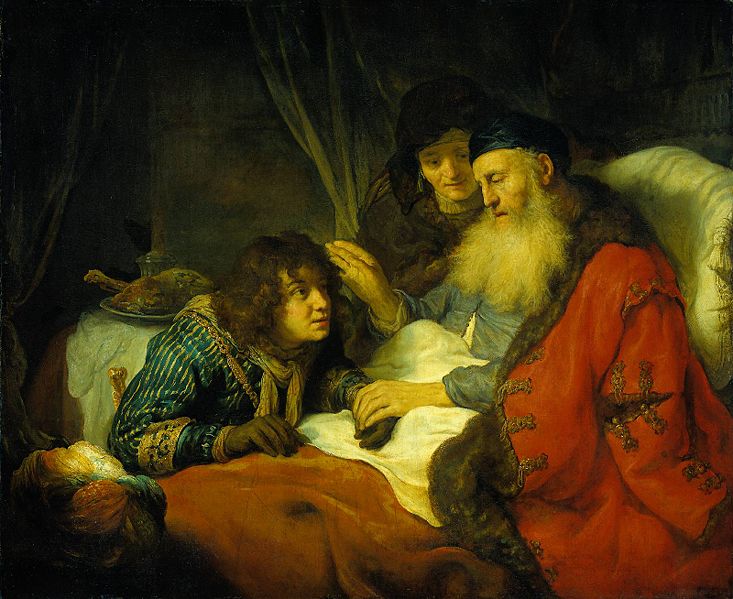
Wikimedia Commons public domain image
***
First of all, I hope that you’re having a happy 22/02/22. However, I’m going to leave the festive celebrations of the day for a moment and move on to other pressing matters.
I’m a bit late in mentioning it, but my latest article for Meridian Magazine went up yesterday:
“There is More to Know About Isaac”
It was inspired by a General Conference address that was given by the late Elder A. Theodore Tuttle of the Seventy. For some reason, his talk has stayed with me in a remarkable fashion over the past several decades.
***
The premiere of the Interpreter Foundation’s new docudrama, Undaunted: Witnesses of the Book of Mormon, is drawing nigh. It’s less than two weeks away. If you would like to be there and to be among the very first to see it, tickets may (I think) still be ordered through the website of the 2022 LDS Film Festival.
***
Jonn Claybaugh has kindly contributed yet another set of his concise study notes to the Interpreter website, for this year’s Sunday School curriculum:
And this has just gone up:
The Interpreter Radio Roundtable for Come, Follow Me Old Testament Lesson 10, “Surely the Lord Is in This Place” on Genesis 28–33, featured Steve Densley, Matthew Bowen and Mark Johnson. The roundtable was extracted from the larger 23 January 2022 broadcast of the Interpreter Radio Show and is now available at no charge and freed from commercial and other distractions. The complete show may be heard at https://interpreterfoundation.org/interpreter-radio-show-January-23-2022/, also without charge. The Interpreter Radio Show can be heard live each week on Sunday evenings, from 7 to 9 PM (MDT), on K-TALK, AM 1640. Alternatively, you can listen live on the Internet at ktalkmedia.com.
So has this:
Nibley Lectures: Come, Follow Me Doctrine and Covenants Lessons 28 (D&C 76)
During 1978, 1979, and 1980, Hugh Nibley taught a Doctrine and Covenants Sunday School class. Cassette recordings were made of these classes and some have survived and were recently digitized by Steve Whitlock. Most of the tapes were in pretty bad condition. The original recordings usually don’t stop or start at the beginning of the class and there is some background noise. Volumes vary, probably depending upon where the recorder was placed in the room. Many are very low volume but in most cases it’s possible to understand the words. In a couple of cases the ends of one class were put on some space left over from a different class. There’s some mixup around D&C90-100 that couldn’t be figured out so those recordings are as they were on the tapes. Even with these flaws and missing classes, we believe these these will be interesting to listen to and valuable to your Come, Follow Me study program. This week we have two lectures, both discussing D&C 76.
***
Some atheists — including Daniel Dennett and Richard Dawkins — have adopted the term Brights to describe themselves. Although a few deny it, the unspoken implication seems to be that theists are Dims. Pretty humble, that. No? Well . . .
Addressing Professor Dawkins, John Cornwell writes,
You start by quoting Bertrand Russell again: ” . . . intellectually eminent men disbelieve in Christian religion,” you quote him as saying, “but they conceal the fact in public, because they are afraid of losing their incomes..”
Quite apart from the provincialism of this (what of eminent Jewish, Muslim, Hindu, and Sikh men), I wondered about bringing in Russell from the outset, as if he were a self-evident expert on the matter. Russell was surely an important figure in philosophy or mathematics, but didn’t he also say some pernicious things outside his area of expertise, especially on the subject of intelligence? For example: “Women are on the average stupider than men.” Just because Bertrand Russell says something doesn’t mean to say that it’s true.
Cornwell acknowledges the possibility that, on the whole, intellectually gifted people may have intellectualized themselves out of faith more than less gifted people may have done. But he’s not as impressed with that possibility as Dr. Dawkins might have expected.
Then you claim that religious believers are in short supply among Britain’s top scientists — the Fellows of the Royal Society — and among members of the Mensa society, the British-founded club for people with high IQ scores. But are not scientists, and self-selecting groups such as Mensa members, apt to display particular kinds of intelligence quite distinct from, say, philosophers, artists, musicians, writers, bankers, actuaries, medical practitioners, novelists, poets, concert pianists, historians, theologians, and anthropologists? I don’t want to dismiss your argument out of hand, but why should anybody take scientists, or the Mensa society, as representing the cream of intellect and imagination, any more than bond-traders, chess-players, pawnbrokers, or cardinals in the Vatican? Each of these callings in life quite obviously represents a specific range of aptitudes. Hence the argument is reduced instantly by applying it in a parallel category: the Jesuits, for example. Jesuits are widely deemed smart and well-educated, quite independently of the Catholic Church. But very few Jesuits, if any, turn out to be scientists; fewer still are atheists, and there are no Jesuit women. Should we therefore take it that atheists, scientists, and women are unlikely to be intellectually eminent?
Besides, Cornwell wonders, isn’t it possible that scientists are themselves a self-selected group that isn’t exactly representative of humankind, or even of gifted humankind, generally?
One should not be surprised that individuals who spend their lives in laboratories pursuing highly focused research programmes in the natural sciences would have little time, appetite, or scope for religiosity.
Finally, a concluding note:
And let’s look more widely at the inferences we could draw. By the year 1920 more than 50 per cent of all Nobel Prize-winners in the natural sciences were Germans. Does this mean that the Germans through this period were cleverer than all other nationalities? By the same token, women have consistently been overlooked by the Nobel panel: again, does this mean that women are less capable of genius in science? Well, we happen to know all too many scandalous cases of women being deprived of their just deserts by the Nobel panel. They include the German-Jewish physicist Lisa Meitner, who should have shared the prize with Otto Hahn for the discovery of fission, and Rosalind Franklin, who should have shared the Watson-Crick prize for the discovery of the structure of DNA.
See John Cornwell, Darwin’s Angel: An Angelic Riposte to The God Delusion (London: Profile Books, 2008), 117-118, 121-123.











